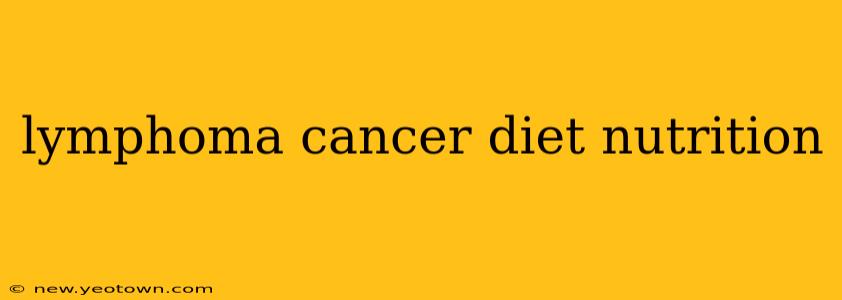Lymphoma, a cancer affecting the lymphatic system, presents unique nutritional challenges. While there's no single "lymphoma diet" that cures the disease, focusing on a nutritious diet can significantly improve quality of life, support treatment, and potentially enhance outcomes. This isn't about restrictive diets; it's about nourishing your body to fight back. Let's explore how nutrition plays a vital role in managing lymphoma.
My name is Alex, and I've been researching and writing about nutrition and cancer for over five years. While I'm not a medical professional, my research is based on the latest scientific findings and consultations with leading oncologists. Always consult your doctor or a registered dietitian for personalized dietary advice tailored to your specific situation and treatment plan.
What to Eat During Lymphoma Treatment: Building a Strong Foundation
Imagine your body as a fortress under siege. Lymphoma treatment, while crucial, can weaken your defenses. A well-planned diet supplies the vital building blocks for repair and renewal. This means prioritizing nutrient-dense foods:
-
Protein Powerhouse: Protein is essential for tissue repair, immune function, and maintaining muscle mass, often lost during treatment. Lean meats, poultry, fish, eggs, beans, lentils, tofu, and Greek yogurt are excellent sources. Aim for protein with every meal.
-
Fruits and Vegetables: The Antioxidant Army: These vibrant foods are packed with antioxidants, vitamins, and minerals that combat oxidative stress, a byproduct of cancer and its treatment. Aim for a rainbow of colors on your plate – the more variety, the better.
-
Whole Grains: Sustained Energy: Whole grains provide sustained energy, crucial for battling fatigue, a common side effect of lymphoma treatment. Opt for brown rice, quinoa, oats, and whole-wheat bread.
-
Healthy Fats: Essential for Function: Healthy fats are essential for hormone production and cell function. Include sources like avocados, nuts, seeds, and olive oil in moderation.
-
Hydration is Key: Staying adequately hydrated is critical for flushing out toxins and supporting bodily functions. Water is best, but you can also include herbal teas and clear broths.
What to Avoid During Lymphoma Treatment: Minimizing Obstacles
Certain foods can interfere with treatment or exacerbate side effects. While moderation is key, it's important to be mindful of:
-
Processed Foods: These are often low in nutrients and high in unhealthy fats, sugar, and sodium, which can hinder your body's ability to fight the disease.
-
Excessive Sugar: High sugar intake can fuel inflammation and potentially impair immune function.
-
Alcohol: Alcohol can interfere with certain medications and worsen side effects.
-
Foods High in Saturated and Trans Fats: These contribute to inflammation and can negatively impact overall health.
Can Certain Foods Fight Lymphoma? The Role of Diet in Cancer Management
While no food can "cure" lymphoma, research suggests that certain nutrients may play a supportive role in cancer management. For example, antioxidants found in colorful fruits and vegetables may help protect cells from damage. However, it's crucial to remember that these are supportive measures, not replacements for conventional medical treatment.
Does Lymphoma Change Nutritional Needs? Addressing Specific Concerns
Yes, lymphoma and its treatment can significantly alter nutritional needs. Nausea, vomiting, fatigue, and changes in taste and appetite are common. Your nutritional needs will depend on the type and stage of lymphoma, as well as the specific treatment you are receiving. This is why consulting a registered dietitian is so important.
What are the Best Supplements to Take for Lymphoma? A Careful Approach
Supplements can sometimes be helpful, but they should always be discussed with your oncologist or dietitian. Some supplements may interact negatively with chemotherapy or radiation. Never self-medicate; personalized guidance is key.
What are the Side Effects of Lymphoma Treatment on Diet and Nutrition? Managing Challenges
Side effects like mouth sores, nausea, and vomiting can make eating difficult. Your doctor or dietitian can recommend strategies to manage these challenges, such as eating smaller, more frequent meals, choosing soft foods, and trying anti-nausea medications.
How to Create a Lymphoma-Friendly Meal Plan: Practical Tips
Creating a lymphoma-friendly meal plan involves prioritizing nutrient-dense foods, focusing on portion control, and addressing any specific dietary restrictions or side effects. Working with a registered dietitian is highly recommended to create a personalized plan. Consider prepping meals ahead of time for busy days. Focus on easy-to-digest foods initially if side effects are severe.
Remember: This information is for educational purposes only and does not constitute medical advice. Always consult with your healthcare team to develop a personalized treatment and dietary plan tailored to your specific needs. Prioritizing proper nutrition is a crucial part of your overall lymphoma care plan, helping you maintain strength, energy, and wellbeing throughout your journey.

